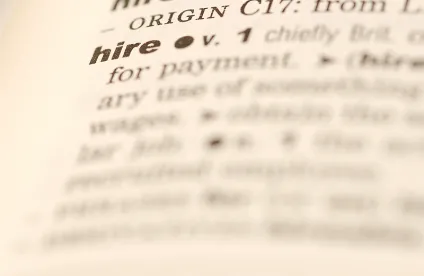Last week, the National Labor Relations Board issued four decisions that provide evidence of the current Board's agenda to chip-away at the Obama-era precedent, as well as insight into a Board that now has a Republican majority and is expected to be more employer-friendly than the NLRB of previous years. The Board's four decisions changed joint-employer status determinations, standards for evaluating facially neutral workplace rules and employee handbook policies, micro-units, and an employer's requirement to give a union notice and an opportunity to bargain when an employer continues established past practices after a Collective Bargaining Agreement (CBA) expires.
Along with these significant decisions, the Board recently published a Request for Information, requesting public comment on the current quickie election rules.
Old Standard For Joint-Employer Status Revived
In 2015, in Browning-Ferris, 362 NLRB No. 186 (2015) ("Browning-Ferris"), the Board uprooted 30 years of precedent when it decided to depart from its former standard, which considered two companies joint employers if they shared or co-determined matters that governed the essential terms and conditions of employment and actually exercised the right to control. Browning-Ferrisexpanded the definition of joint-employer, by setting aside the requirement that an employer actually exercise control. Instead, under Browning-Ferris, to be considered a joint-employer, employers only had to retain a contractual right to exercise control, regardless of whether they actually exercised control.
Overruling Browning-Ferris and reviving pre-Browning-Ferris precedent, the current Board in Hy-Band Industrial Contractors, 365 NLRB No. 156 (2017) ("Hy-Band"), gifted employers a more balanced standard for determining joint-employer status. Like before, Hy-Band articulates that to be considered joint-employers, two entities must directly and immediately exercise control over the essential employment terms of another entity's employees. No longer is indirect control, the contractual right to control that's not actually exercised, or limited and routine control, enough to establish joint-employer status.
New Standard For Facially Neutral Workplace Rules and Handbook Policies
The Board also overruled Lutheran Heritage Village-Livonia, 343 NLRB No. 646 (2004) ("Lutheran Heritage") and created a new standard for evaluating neutral workplace rules and employee handbook policies. Under Lutheran Heritage, a facially neutral workplace rule or handbook policy could still violate the National Labor Relations Act (NLRA), if employees could "reasonably construe" the rule as preventing them from exercising their Section 7 rights. However, in The Boeing Company, 365 No. 154 (2017) ("Boeing"), the current Board scrapped Lutheran Heritage. Under its new standard, to evaluate whether a seemingly neutral employer rule or handbook policy violates the NLRA, the Board will consider: (1) the nature and extent of the potential impact on NLRA rights, and (2) legitimate justifications associated with the rule.
To provide further guidance, the Board also announced three categories that an employer rule or policy can fall under, depending on whether the rule is deemed lawful, unlawful, or warrants individualized scrutiny. Employers should welcome this new standard as good news, as the Board will now weigh an employer's business interests against potential interference with employee rights, as opposed to the former Lutheran Heritage standard's sole focus on employee rights.
The Elimination of Micro-Units
In PPC Structurals, Inc., 365 NLRB No. 160 (2017), the Board addressed what standard should be used for determining an appropriate bargaining unit. The Board decided to reinstate the traditional community-of-interest standard and eliminate the concept of micro-units, or a small group of employees organized by unions. By overruling Specialty Healthcare & Rehabilitation Center of Mobile, 357 NLRB No. 83 (2011), the Board has decided that unions can no longer create a bargaining unit by merely showing a small group of employees are a "readily identifiable" group that share an "overwhelming community of interests." Thus, unions cannot organize minority shares of an employer's workforce as a way to introduce unionization into the employer's business without a majority of the workforce. Reaching back to prior precedent, the Board will again evaluate the interests of all employees, both those within and those outside of the petitioned-for unit, in determining appropriate bargaining units. This means employers can avoid bargaining with fractured units.
Employers' Past Practice of Unilateral Change After CBA Expiration
The Board delivered another win for employers in Raytheon Network Centric Systems, 365 NLRB No. 161 (2017) ("Raytheon"). In Raytheon the Board rejected the holding of E.I. Du Pont de Nemours, 364 NLRB No. 113 (2016) ("Du Pont"), which held that if a CBA had expired and an employer continued to engage in past practices it would constitute a change that required an employer to provide a union with notice and an opportunity to bargain, pursuant to Section 8(a)(5) of the NLRA.
However, the Board has again embraced the pre-Du Pont standard, where an employer's established past practices can become part of the status quo, so long as the employer follows a well-established past practice. The Board now views an employer's past practices as a term and condition of employment, allowing the employer to take unilateral action that does not materially differ from past practices without providing notice or an opportunity to bargain to a union. However, if a unilateral change impacts a mandatory subject of bargaining, employers are still obligated to bargain, upon a union's request.
A Second Look At Quickie Elections
Recently, the Board also said it would seek public comment on quickie election rules. The quickie election rule, adopted in 2014, changed the process and timing of union elections, arguably in favor of unions. Previous to the current rule, the union election process allowed for a much longer timeframe between the filing of a petition for an election and the actual election. Under the current quickie election rule, the timeframe has been shortened on average to 23 days, making it easier for unions to organize unrepresented employees and more difficult for employers to provide arguments against unionization. The Board's Request for Information, asks whether the rule should be retained, modified, or rescinded. The deadline for public comment is February 12, 2018.





 />i
/>i

